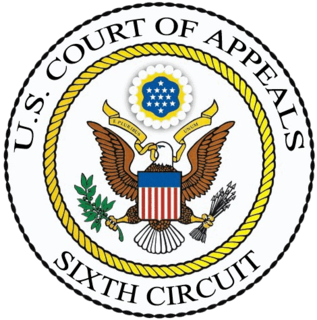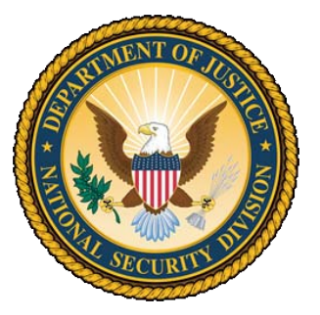
The United States Foreign Intelligence Surveillance Court is a U.S. federal court established under the Foreign Intelligence Surveillance Act of 1978 (FISA) to oversee requests for surveillance warrants against foreign spies inside the United States by federal law enforcement and intelligence agencies. Such requests are made most often by the National Security Agency (NSA) and the Federal Bureau of Investigation (FBI). Congress created FISA and its court as a result of the recommendations by the U.S. Senate's Church Committee.

The Foreign Intelligence Surveillance Act of 1978 is a United States federal law that establishes procedures for the physical and electronic surveillance and the collection of "foreign intelligence information" between "foreign powers" and "agents of foreign powers" suspected of espionage or terrorism. The Act created the Foreign Intelligence Surveillance Court (FISC) to oversee requests for surveillance warrants by federal law enforcement and intelligence agencies. It has been repeatedly amended since the September 11 attacks.

The United States Foreign Intelligence Surveillance Court of Review (FISCR) is a U.S. federal court whose sole purpose is to review denials of applications for electronic surveillance warrants by the United States Foreign Intelligence Surveillance Court. The FISCR was established by the Foreign Intelligence Surveillance Act of 1978 and consists of a panel of three judges. Like the FISC, the FISCR is not an adversarial court; rather, the only party to the court is the federal government, although other parties may submit briefs as amici curiae if they are made aware of the proceedings. Papers are filed and proceedings are held in secret. Records of the proceedings are kept classified, though copies of the proceedings with sensitive information redacted are very occasionally made public. The government may appeal decisions of the FISCR to the Supreme Court of the United States, which hears appeals on a discretionary basis.
The USA PATRIOT Act was passed by the United States Congress in 2001 as a response to the September 11, 2001 attacks. It has ten titles, each containing numerous sections. Title II: Enhanced Surveillance Procedures granted increased powers of surveillance to various government agencies and bodies. This title has 25 sections, with one of the sections containing a sunset clause which sets an expiration date, December 31, 2005, for most of the title's provisions. This was extended twice: on December 22, 2005 the sunset clause expiration date was extended to February 3, 2006 and on February 2 of the same year it was again extended, this time to March 10.

NSA warrantless surveillance — also commonly referred to as "warrantless-wiretapping" or "-wiretaps" — refers to the surveillance of persons within the United States, including U.S. citizens, during the collection of notionally foreign intelligence by the National Security Agency (NSA) as part of the Terrorist Surveillance Program. In late 2001, the NSA was authorized to monitor, without obtaining a FISA warrant, the phone calls, Internet activity, text messages and other communication involving any party believed by the NSA to be outside the U.S., even if the other end of the communication lay within the U.S.

American Civil Liberties Union v. National Security Agency, 493 F.3d 644, is a case decided July 6, 2007, in which the United States Court of Appeals for the Sixth Circuit held that the plaintiffs in the case did not have standing to bring the suit against the National Security Agency (NSA), because they could not present evidence that they were the targets of the so-called "Terrorist Surveillance Program" (TSP).

The following is a section summary of the USA PATRIOT Act, Title II. The USA PATRIOT Act was passed by the United States Congress in 2001 as a response to the September 11, 2001 attacks. Title II: Enhanced Surveillance Procedures gave increased powers of surveillance to various government agencies and bodies. This title has 25 sections, with one of the sections containing a sunset clause which sets an expiration date, 31 December 2005, for most of the title's provisions. On 22 December 2005, the sunset clause expiration date was extended to 3 February 2006.
The American Bar Association passed resolutions on the USA PATRIOT Act that asked the U.S. Government "to conduct a thorough review of the implementation of the powers granted to the Executive Branch under the Act before considering legislation that would extend or further expand such powers ...." and "to conduct regular and timely oversight including public hearings ... to ensure that government investigations undertaken pursuant to the Foreign Intelligence Surveillance Act ... do not violate the First, Fourth, and Fifth Amendments of the Constitution ...." They also set up a website to discuss issues in relation to the Act, and thus the Patriot Debates were born, where various people debated specific sections.

The United States Department of Justice National Security Division (NSD) handles national security functions of the department. Created by the 2005 USA PATRIOT Act reauthorization, the division consolidated all of the department's national security and intelligence functions into a single division. The division is headed by the Assistant Attorney General for National Security.

Hepting v. AT&T is a United States class action lawsuit filed in January 2006 by the Electronic Frontier Foundation (EFF) against the telecommunications company AT&T, in which the EFF alleges that AT&T permitted and assisted the National Security Agency (NSA) in unlawfully monitoring the communications of the United States, including AT&T customers, businesses and third parties whose communications were routed through AT&T's network, as well as voice over IP telephone calls routed via the Internet.
Warrantless searches are searches and seizures conducted without court-issued search warrants.

The Protect America Act of 2007 (PAA),, is a controversial amendment to the Foreign Intelligence Surveillance Act (FISA) that was signed into law by U.S. President George W. Bush on August 5, 2007. It removed the warrant requirement for government surveillance of foreign intelligence targets "reasonably believed" to be outside the United States. The FISA Amendments Act of 2008 reauthorized many provisions of the Protect America Act in Title VII of FISA.

The history of the USA PATRIOT Act involved many parties who opposed and supported the legislation, which was proposed, enacted and signed into law 45 days after the September 11 terrorist attacks in 2001. The USA PATRIOT Act, though approved by large majorities in the U.S. Senate and House of Representative, was controversial, and parts of the law were invalidated or modified by successful legal challenges over constitutional infringements to civil liberties. The Act had several sunset provisions, most reauthorized by the USA PATRIOT Improvement and Reauthorization Act of 2005 and the USA PATRIOT Act Additional Reauthorizing Amendments Act. Both reauthorizations incorporated amendments to the original USA PATRIOT Act, and other federal laws.

The FISA Amendments Act of 2008, also called the FAA and Foreign Intelligence Surveillance Act of 1978 Amendments Act of 2008, is an Act of Congress that amended the Foreign Intelligence Surveillance Act. It has been used as the legal basis for surveillance programs disclosed by Edward Snowden in 2013, including PRISM.
Clapper v. Amnesty International USA, 568 U.S. 398 (2013), was a United States Supreme Court case in which the Court held that Amnesty International USA and others lacked standing to challenge 50 U.S.C. § 1881a of the Foreign Intelligence Surveillance Act as amended by the Foreign Intelligence Surveillance Act of 1978 Amendments Act of 2008.
The Fourth Amendment Protection Acts, are a collection of state legislation aimed at withdrawing state support for bulk data (metadata) collection and ban the use of warrant-less data in state courts. They are proposed nullification laws that, if enacted as law, would prohibit the state governments from co-operating with the National Security Agency, whose mass surveillance efforts are seen as unconstitutional by the proposals' proponents. Specific examples include the Kansas Fourth Amendment Preservation and Protection Act and the Arizona Fourth Amendment Protection Act. The original proposals were made in 2013 and 2014 by legislators in the American states of Utah, Washington, Arizona, Kansas, Missouri, Oklahoma and California. Some of the bills would require a warrant before information could be released, whereas others would forbid state universities from doing NSA research or hosting NSA recruiters, or prevent the provision of services such as water to NSA facilities.

The USA Freedom Act is a U.S. law enacted on June 2, 2015, that restored and modified several provisions of the Patriot Act, which had expired the day before. The act imposes some new limits on the bulk collection of telecommunication metadata on U.S. citizens by American intelligence agencies, including the National Security Agency. It also restores authorization for roving wiretaps and tracking lone wolf terrorists. The title of the act is a ten-letter backronym that stands for Uniting and Strengthening America by Fulfilling Rights and Ensuring Effective Discipline Over Monitoring Act of 2015.

The FISA Improvements Act is a proposed act by Senator Dianne Feinstein, Chair of the Senate Intelligence Committee. Prompted by the disclosure of NSA surveillance by Edward Snowden, it would establish the surveillance program as legal, but impose some limitations on availability of the data. Opponents say the bill would codify warrantless access to many communications of American citizens for use by domestic law enforcement.

Proposed reforms of mass surveillance by the United States are a collection of diverse proposals offered in response to the Global surveillance disclosures of 2013.
In Re Electronic Privacy Information Center, 134 S.Ct. 638 (2013), was a direct petition to the Supreme Court of the United States regarding the National Security Agency's (NSA) telephony metadata collection program. On July 8, 2013, the Electronic Privacy Information Center (EPIC) filed a petition for a writ of mandamus and prohibition, or a writ of certiorari, to vacate an order of the Foreign Intelligence Surveillance Court (FISC) in which the court compelled Verizon to produce telephony metadata records from all of its subscribers' calls and deliver those records to the NSA. On November 18, 2013, the Supreme Court denied EPIC's petition.







